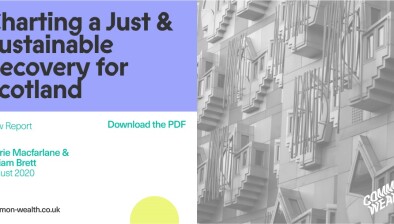Report outlines roadmap towards land reform in Scotland
A comprehensive toolkit of policies and actions providing a roadmap towards land reform in Scotland have been outlined in a new report published today by the New Economics Foundation and the Common Weal think tank.

‘Our Land’ provides an analysis of why concentrated land ownership is harming Scotland; sets out a comprehensive plan for proper reform; demonstrates that it is legal and possible within the powers Scotland already has and; sets out a vision for what a new Scottish landscape could look like.
Land reform in Scotland has been debated for centuries, punctuated with landmark works which have shown what is wrong with land ownership in Scotland, how it happened and what harm it has done to the country. Until now there has not been a comprehensive plan of how to challenge and change the situation.
The report makes a detailed economic case for the way that concentrated land ownership has held back Scotland and its communities; assesses the legality of land reform and; sets out a vision for what it could mean to Scotland if land reform was achieved. But at the heart of the report is a comprehensive toolkit of actions and policies which can be used to make this happen.
Land reform expert Andy Wightman MSP, an advisor on the report, said: “This report provides a commonsense approach to tackling land reform in Scotland. The land question is centuries old, yet Governments have repeatedly shied away from it.
“This report is a tipping point in the debate and provides solutions which are in the gift of the Scottish Parliament to implement. I wholeheartedly endorse this comprehensive, well-researched and sensible approach to deal with the inequality and unfairness of land ownership in Scotland.”
Leading land reform activist, journalist and broadcaster Lesley Riddoch, who contributed the foreword for the report, added: “All the recommendations in this landmark report are legal within the existing powers of the Scottish Parliament, in line with international law, practised elsewhere and ready to be enacted now in Scotland. All that’s missing is the political will to mobilise a cross-party alliance, tackle age-old fears of confronting Scotland’s big landowners and finally achieve the transformation dreamed about by generations of our forebears who finally settled for less or took their energy, culture, language and dreams elsewhere.
“Merely tweaking the developed world’s worst landownership system won’t save precious habitats, repopulate the glens or give Scots affordable leisure-time in their own country. This report is a policy roadmap showing how the land question can be tackled and what a normal Scotland might actually look like. I hope it puts land reform right back on the agenda for the Scottish Parliament and its parties.”
It is well known that Scotland has one of the most concentrated patterns of land ownership in the world but the report goes further in analysing some of the negative impacts that – and the land management practices it results in – has on Scotland, including:
- It enables various forms of ‘rent-seeking’ which reduces economic performance and increases economic inequality
- It reduces the capacity for business start-up and business expansion
- It inhibits rural community development and expansion
- It is a key driver of the rural housing crisis and leads to depopulation and the inability of business to source a workforce
- It leads to poor land management which reduces the carbon performance of Scotland’s land and harms biodiversity
- It creates significant power imbalance over influence on rural policy and so distorts Scotland’s democracy
- All of this suppresses Scotland’s human, environmental and economic potential
The report then sets out a package of measures, all within the powers of the Scottish Parliament and legal under international law, which can be used to transform the pattern of land ownership and management in Scotland. The recommendations include:
- Complete a comprehensive land registry to provide full transparency on who owns Scotland’s land
- Introduce some form of land taxation to incentivise better productive use of land
- Reform agricultural and business subsidies to emphasise the quality of land use
- Introduce a cap on the maximum amount of land one ‘beneficial owner’ can own
- Use Compulsory Sales Orders to encourage and where necessary require some landowners to sell land to the public. This can be required to be broken into small plot sizes to enable land access by small and medium-sized businesses, communities and small investors
- Use Compulsory Purchase Orders to buy land for public good purposes
- Extend the planning system to rural land to ensure a public-good criteria for land use
- Give communities a legal right to a say in the planning process for land in their vicinity
- Create a proper system of local democracy in Scotland to empower communities to shape land use
- Introduce a rural housebuilding strategy to tackle the rural housing crisis with communities empowered to address this directly through local democracy
- Reform the regulation of key practices in rural areas such as deer and grouse moor management to require more environmentally-sustainable practices
- Task the Scottish National Investment Bank to create a substantial land investment fund to support start-up and expanding businesses and community development
- Establish a National Land Agency to oversee all of the above
Duncan McCann from the New Economics Foundation said: “Significant land reform is vitally important if we want Scotland to be a more equal society as well as address the massive challenges of climate change and rural regeneration. The recommendations contained in this report, all of which can be implemented by the Scottish Government under the existing devolution arrangements, would go a long way towards creating the foundation we need to create the just and prosperous Scotland we all want to see.”







